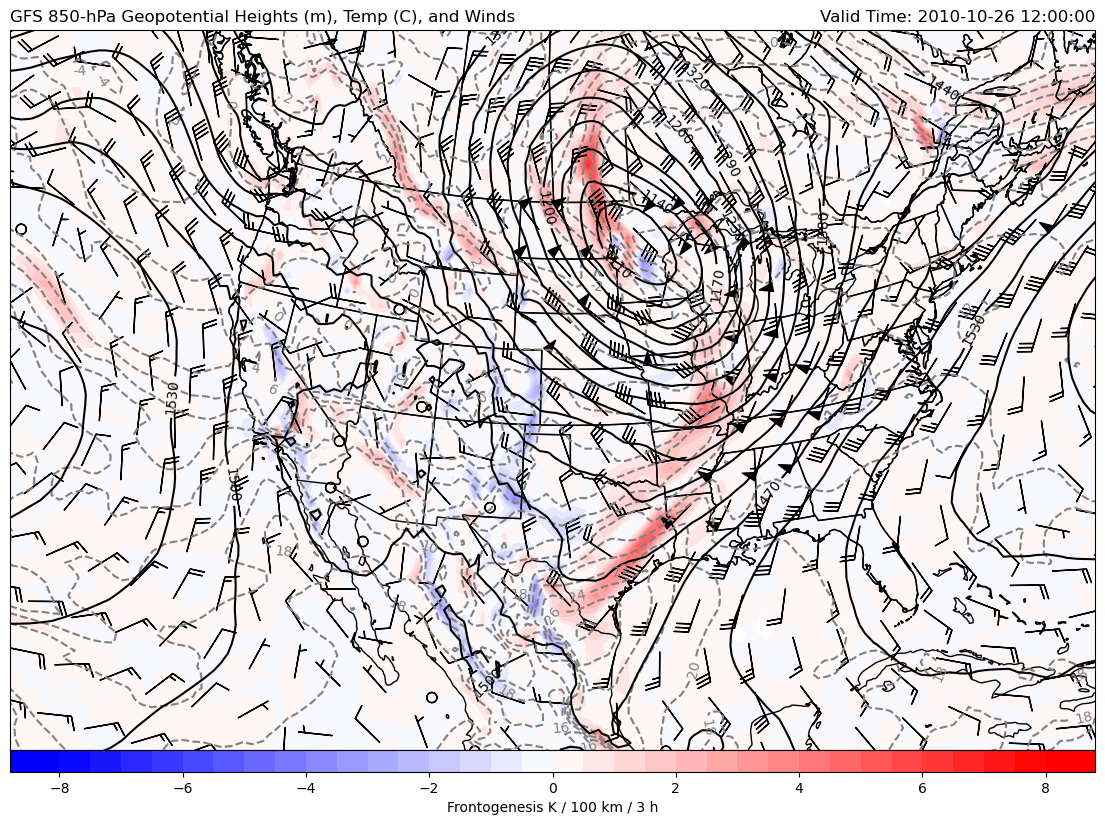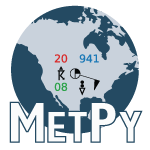850-hPa Geopotential Heights, Temperature, Frontogenesis, and Winds
Frontogenesis at 850-hPa with Geopotential Heights, Temperature, and Winds
This example uses example data from the GFS analysis for 12 UTC 26 October 2010 and uses xarray as the main read source with using MetPy to calculate frontogenesis and wind speed with geographic plotting using Cartopy for a CONUS view.
Import the needed modules.
import cartopy.crs as ccrs
import cartopy.feature as cfeature
import matplotlib.pyplot as plt
import metpy.calc as mpcalc
from metpy.units import units
import numpy as np
import xarray as xr
Use Xarray to access GFS data from THREDDS resource and uses metpy accessor to parse file to make it easy to pull data using common coordinate names (e.g., vertical) and attach units.
ds = xr.open_dataset('https://thredds.ucar.edu/thredds/dodsC/casestudies/'
'python-gallery/GFS_20101026_1200.nc').metpy.parse_cf()
Could not find variable corresponding to the value of grid_mapping: LatLon_Projection
Could not find variable corresponding to the value of grid_mapping: LatLon_Projection
Could not find variable corresponding to the value of grid_mapping: LatLon_Projection
Could not find variable corresponding to the value of grid_mapping: LatLon_Projection
Could not find variable corresponding to the value of grid_mapping: LatLon_Projection
Could not find variable corresponding to the value of grid_mapping: LatLon_Projection
Could not find variable corresponding to the value of grid_mapping: LatLon_Projection
Could not find variable corresponding to the value of grid_mapping: LatLon_Projection
Could not find variable corresponding to the value of grid_mapping: LatLon_Projection
Subset data based on latitude and longitude values, calculate potential temperature for frontogenesis calculation.
# Set subset slice for the geographic extent of data to limit download
lon_slice = slice(200, 350)
lat_slice = slice(85, 10)
# Grab lat/lon values (GFS will be 1D)
lats = ds.lat.sel(lat=lat_slice).values
lons = ds.lon.sel(lon=lon_slice).values
level = 850 * units.hPa
hght_850 = ds.Geopotential_height_isobaric.metpy.sel(
vertical=level, lat=lat_slice, lon=lon_slice).squeeze()
tmpk_850 = ds.Temperature_isobaric.metpy.sel(
vertical=level, lat=lat_slice, lon=lon_slice).squeeze()
uwnd_850 = ds['u-component_of_wind_isobaric'].metpy.sel(
vertical=level, lat=lat_slice, lon=lon_slice).squeeze()
vwnd_850 = ds['v-component_of_wind_isobaric'].metpy.sel(
vertical=level, lat=lat_slice, lon=lon_slice).squeeze()
# Convert temperatures to degree Celsius for plotting purposes
tmpc_850 = tmpk_850.metpy.convert_units('degC')
# Calculate potential temperature for frontogenesis calculation
thta_850 = mpcalc.potential_temperature(level, tmpk_850)
# Get a sensible datetime format
vtime = ds.time.data[0].astype('datetime64[ms]').astype('O')
Calculate frontogenesis
Frontogenesis calculation in MetPy requires temperature, wind components, and grid spacings. First compute the grid deltas using MetPy functionality, then put it all together in the frontogenesis function.
Note: MetPy will give the output with SI units, but typically frontogenesis (read: GEMPAK) output this variable with units of K per 100 km per 3 h; a conversion factor is included here to use at plot time to reflect those units.
fronto_850 = mpcalc.frontogenesis(thta_850, uwnd_850, vwnd_850)
# A conversion factor to get frontogensis units of K per 100 km per 3 h
convert_to_per_100km_3h = 1000*100*3600*3
/home/runner/miniconda3/envs/cookbook-dev/lib/python3.10/site-packages/pint/facets/plain/quantity.py:1006: RuntimeWarning: invalid value encountered in divide
magnitude = magnitude_op(new_self._magnitude, other._magnitude)
Plotting Frontogenesis
Using a Lambert Conformal projection from Cartopy to plot 850-hPa variables including frontogenesis.
# Set map projection
mapcrs = ccrs.LambertConformal(central_longitude=-100, central_latitude=35,
standard_parallels=(30, 60))
# Set projection of the data (GFS is lat/lon)
datacrs = ccrs.PlateCarree()
# Start figure and limit the graphical area extent
fig = plt.figure(1, figsize=(14, 12))
ax = plt.subplot(111, projection=mapcrs)
ax.set_extent([-130, -72, 20, 55], ccrs.PlateCarree())
# Add map features of Coastlines and States
ax.add_feature(cfeature.COASTLINE.with_scale('50m'))
ax.add_feature(cfeature.STATES.with_scale('50m'))
# Plot 850-hPa Frontogenesis
clevs_tmpc = np.arange(-40, 41, 2)
cf = ax.contourf(lons, lats, fronto_850*convert_to_per_100km_3h,
np.arange(-8, 8.5, 0.5), cmap=plt.cm.bwr, extend='both',
transform=datacrs)
cb = plt.colorbar(cf, orientation='horizontal', pad=0, aspect=50,
extendrect=True)
cb.set_label('Frontogenesis K / 100 km / 3 h')
# Plot 850-hPa Temperature in Celsius
csf = ax.contour(lons, lats, tmpc_850, clevs_tmpc, colors='grey',
linestyles='dashed', transform=datacrs)
plt.clabel(csf, fmt='%d')
# Plot 850-hPa Geopotential Heights
clevs_850_hght = np.arange(0, 8000, 30)
cs = ax.contour(lons, lats, hght_850, clevs_850_hght, colors='black',
transform=datacrs)
plt.clabel(cs, fmt='%d')
# Plot 850-hPa Wind Barbs only plotting every fifth barb
wind_slice = (slice(None, None, 5), slice(None, None, 5))
ax.barbs(lons[wind_slice[0]], lats[wind_slice[1]],
uwnd_850[wind_slice].metpy.convert_units('kt').values,
vwnd_850[wind_slice].metpy.convert_units('kt').values,
color='black', transform=datacrs)
# Plot some titles
plt.title('GFS 850-hPa Geopotential Heights (m), Temp (C), and Winds',
loc='left')
plt.title(f'Valid Time: {vtime}', loc='right')
Text(1.0, 1.0, 'Valid Time: 2010-10-26 12:00:00')


